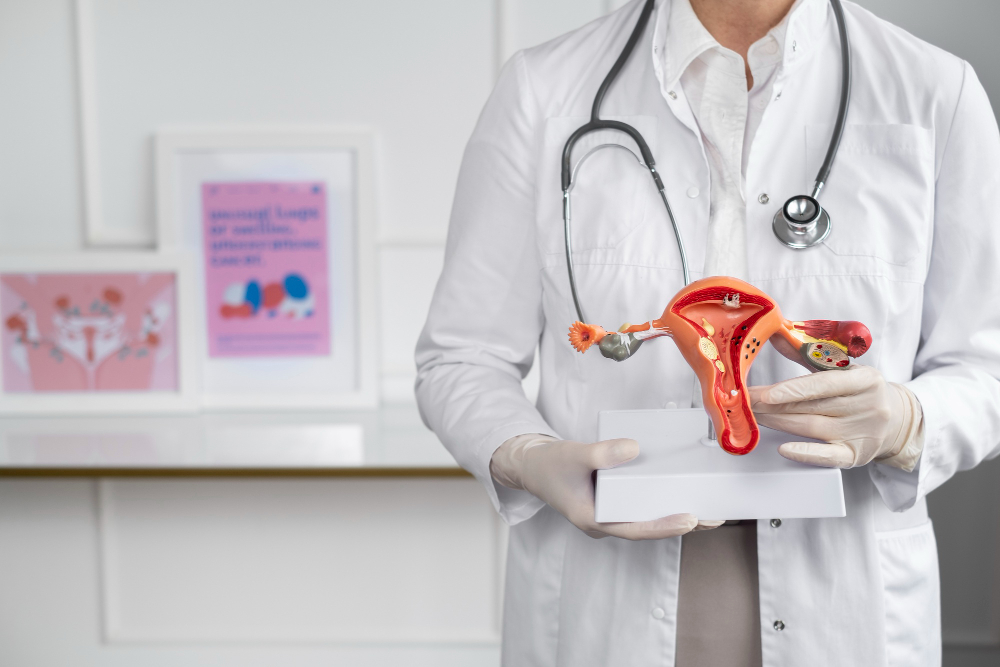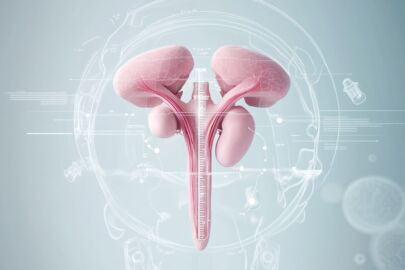
Nowadays, it feels like everyone knows someone struggling with PCOS. The modern lifestyle, with its unhealthy eating habits and lack of physical activity, has really contributed to a spike in PCOS cases among women. Polycystic Ovary Syndrome (PCOS) is a hormonal disorder that commonly affects women during their reproductive years. Nearly 15% of women suffer from this condition, making it quite common.
In PCOS, hormonal imbalances can prevent regular ovulation, leading to the formation of small fluid-filled sacs, or cysts, along the outer edge of the ovaries. These cysts contain immature eggs, called follicles, which are not released as they should be. The cysts also produce androgen, a hormone typically found in higher levels in men but present in smaller amounts in women. This excess androgen disrupts the menstrual cycle, causing irregular periods, missed cycles, or unpredictable ovulation. As a result, PCOS is one of the leading causes of infertility in women.
According an article from The Hindu newspaper, 1 in 5 women, that is 20% of women in India suffer from PCOS
What are the causes of PCOS?
The causes of PCOS in women may vary from person to person. The exact reason is unknown. These are some of the common causes that might play a role in PCOS:
Insulin Resistance
When cells become resistant to insulin, blood sugar levels rise, prompting the pancreas to produce more insulin to manage the excess sugar. This elevated insulin can increase androgen levels, which may disrupt ovulation.
Hereditary Factors
PCOS can run in families, meaning if your mother or sister has it, you are more likely to develop it too. Certain genetic factors may be linked to PCOS, passing it down through generations.
Excess Androgen
In some cases, the ovaries produce higher levels of androgens, which disrupts ovulation. This hormonal imbalance can lead to issues like hirsutism (excess hair growth) and acne.
What are the symptoms of PCOS?
Irregular Periods
Irregular periods are one of the most common signs of PCOS. Some people may experience very short periods, while others might have prolonged bleeding lasting up to a month. Others may go long stretches without a period, which can make it difficult to conceive.
Excess Hair Growth
Abnormal hair growth on the arms, chest, abdomen, and face is another common symptom of PCOS, known as hirsutism. Around 70% of people with PCOS experience excess facial and body hair.
Skin Discoloration
Insulin resistance, a frequent issue with PCOS, can lead to darkened patches of skin in areas like the neck, underarms, groin, and beneath the breasts.
Obesity
Many people with PCOS struggle with weight gain and find it difficult to maintain a healthy weight, with approximately 40-80% of PCOS sufferers affected by obesity.
Polycystic Ovaries
PCOS often results in the formation of multiple cysts on the outer layer of the ovaries, making them appear larger with numerous follicles.
Infertility
Irregular periods and hormonal imbalances caused by PCOS can make it difficult for women to get pregnant, making PCOS one of the leading causes of infertility.
How does PCOS affect pregnancy?
Even with a PCOS diagnosis, it’s still possible to get pregnant. While PCOS can make conception more challenging and lower your chances, it doesn’t mean it’s impossible. It also increases the risk of pregnancy complications, but there are several treatment options available, including assisted reproductive technologies like IVF. To explore your options and find the best treatment plan, it’s important to consult a healthcare provider who can assess your condition and guide you through the right steps.
What are the ways to diagnose PCOS?
To diagnose PCOS, it’s essential to consult a hospital with expertise in this area. Credence Hospital, a leading name in women’s care and reproductive medicine in Kerala, is here to help. At Credence, we begin by reviewing your health history and symptoms. You may then undergo a physical exam, ultrasound, or blood test to confirm the diagnosis.
The physical exam includes a pelvic check to assess the health of your reproductive organs. An ultrasound helps determine the size of your ovaries and the presence of cysts, while a blood test identifies your blood sugar levels and hormone balance, including androgen levels.
What are the treatment options for PCOS?
The treatment plan for PCOS can vary from person to person, as many factors need to be considered. Even lifestyle changes can significantly improve PCOS symptoms.
Here are some treatment options:
If you’re planning to get pregnant:
Diet and activity changes
Living a healthier life with a balanced diet and regular exercise can help you lose weight and manage your overall health. This can help regulate insulin levels and restore hormonal balance, increasing your chances of ovulation and pregnancy.
Medicines
Certain medications can stimulate the release of eggs. However, these hormonal treatments may carry the risk of ovarian hyperstimulation, which can cause bloating and pelvic pain.
IVF
In vitro fertilization (IVF) is an assisted reproductive method for individuals with PCOS when other treatments have not worked. IVF involves extracting mature eggs, fertilizing them outside the body, and placing the fertilized egg back into the uterus.
If pregnancy is not your goal:
Medicines to reduce androgens
There are medications that can reduce the effects of androgens, which can help with hair growth and acne. These must be taken under the guidance of a healthcare provider.
Hormonal birth control
Birth control pills, patches, or intrauterine devices (IUDs) can help regulate your menstrual cycle.
Insulin-sensitizing medicine
This type of medication, often used to treat diabetes, combats insulin resistance, one of the primary causes of PCOS. It can also help regulate menstrual cycles.
Wrap Up
In conclusion, PCOS is a complex and increasingly common condition affecting women worldwide. Although the exact cause of PCOS remains unclear, it is evident that factors like insulin resistance, genetics, and elevated androgen levels play a significant role. The symptoms of PCOS, such as irregular periods, excess hair growth, skin discoloration, and infertility, can deeply impact a woman’s physical and emotional well-being. However, with proper diagnosis and personalized treatment plans, many of these challenges can be managed. Lifestyle modifications, medication, and assisted reproductive technologies like IVF offer hope to women with PCOS, whether they seek to conceive or simply manage their symptoms. Early diagnosis and consistent medical care are crucial, and healthcare providers like Credence Hospital best ivf treatment center in Kerala can guide patients on the path to better health and wellness.



